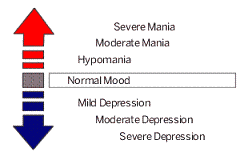Bipolar personality disorder
One of the biggest misconceptions concerning a bipolar illness is its tendency to be mistaken for a personality disorder, which leads to miss diagnosis and poor treatment plans. Confusing the manic mood swings with a personality disorder also shows a limited understanding of the illness, along with how society has latched onto the term "bipolar" to describe any number or weird or annoying personality traits. Learning that a borderline personality disorder is marked by a pattern of behaviors and emotional responses that have developed over an extended period of time while a bipolar illness usually begins to appear in adults after puberty, and is characterized by sudden mood swings is one of the first steps towards education and the right treatment plan. In the following article you will find all of the facts concerning the differences between a bipolar and personality disorder clearly explained so you can start experiencing life without the manic highs and lows.








